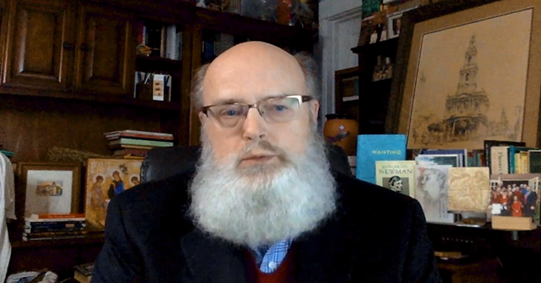It all started as an idea for a book.
At least, that was the initial thought of Alex Lessard, Ph.D., adjunct professor at the University of St. Thomas in Minnesota, when he founded Adeodatus, a nonprofit dedicated to providing resources to support an increased renewal of Catholic education, which has seen a steep decline in Catholic school attendance since the 1960s.
Lessard began approaching leading experts on Catholic education, asking them to contribute to the book, which would present the major sources of Catholic education in an accessible way to parents and educators.
But Lessard ran into a problem: “Education itself is based in friendship,” he said.
“It became clear that we should do this in a community, and that was reinforced by the terrible consequences of not having these communities during [COVID-19] lockdowns.”
So from a book, Lessard shifted to the idea of a conference — and more than just one, but a series of three annual conferences. The first Adeodatus Conference on Catholic Education and Culture will be held on June 21-24 at St. Andrew Church and the Westin Hotel in Pasadena.
The conference will feature more than 20 keynote speakers, panelists, and guests, including Father Robert Spitzer and Michael P. Foley, each speaking about foundational figures in Catholic education ranging from the ancient Greeks to modernity.
“We have so many charisms within Catholic education, primarily through the orders, but also these figures that informed a modern renewal, from Newman to De Konnick to Chesterton,” Lessard said.
The conference will attempt to tie these foundational concepts directly to the history and culture of Los Angeles, especially through an increased awareness of LA’s patron saint, St. Vibiana. Each attendee will receive a book about this relatively unknown Roman martyr, whose relics are entombed at the Cathedral of Our Lady of the Angels.
“We will try to bring back the practices, the understandings, of particular Catholic culture,” Lessard said. “The culture of Los Angeles is formed by all the great missions of Junípero Serra, but also Vibiana and the great bishops who, over time, have made Los Angeles the great center of Catholic education for so long.”
The three-year cycle of conferences finds its inspiration in the plenary councils of Baltimore — three formal meetings of U.S. bishops in the 1800s that led to the creation of the American parochial school system.
“In this first year, we want to celebrate the whole tradition and get back to the fundamentals of Benedictine, Franciscan, Ignatian, LaSallian, and all other forms of Catholic education,” Lessard said. “We have this rich tradition that is like the body of Christ in its many members.”
The Catholic themes for the next two conferences have already been set: In 2024, the focus will be on educational philosophies and pedagogy, while the 2025 conference will be centered on ideas for how to grow Catholic education in the future.
Each conference also plans to incorporate patronage for Catholic fine arts.
“As you see in our title, it’s the conference on Catholic education and culture,” Lessard said. “The renewal is of both education and culture. They go hand in hand.”
For attendees this year, that means an optional pre-conference program on sacred arts. The final day of the conference will also feature the Los Angeles premiere of Frank La Rocca’s “Mass of the Americas,” a musical Mass setting commissioned by Archbishop Salvatore Cordileone of San Francisco.
And in the end, Lessard is still getting his book.
“Out of each conference, we will be still publishing a handbook on Catholic education and culture,” he said. “It will take all the live presentations, but also supplement them with many more contributions to the theme of the year. Those three volumes of the handbook will form a roadmap for understanding the tradition and where the renewal of Catholic Education in America is right now.
“We have a situation where we have a perfect moment to take what has been an independent and fairly small movement of renewal within Catholic education in America and really accelerate it. The demand is there, the will of parents, and our work at Adeodatus is to try and support that.”

